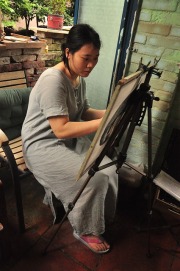Creative people begin projects with the goal of finishing them. No writer or artist has ever thought, “My goal is to quit this project when I’m halfway through.” If you find you’re consistently not  finishing, you’ve developed a bad habit and you’d better do something about it.
finishing, you’ve developed a bad habit and you’d better do something about it.
Creative work may be joyous. Yet it is sometimes tedious and unenjoyable. It’s natural to prefer what’s easier. The easiest choice is not to work at all today. But that usually results in feeling guilty and irresponsible. The works you may be devoting a good part of your life to never gets done.
Productivity is the creative’s main purpose—bringing all the training and talents into the act of producing finished works of the highest quality the artist is capable of at this time.
High-achieving creatives exert more energy from the start of a project and work steadily without long interruptions for a much longer period than the majority of creatives, often producing staggering amounts of their best work.
How do you break a habit like avoiding writing or painting or quitting before you should? There is only one way, as pointed out by the foremost American psychologist Willian James, and that is to  start another contrary, more fruitful habit. To break the habit of consistently not writing, you develop the habit of writing regularly. To combat the habit of quitting too soon, you make yourself not quit.
start another contrary, more fruitful habit. To break the habit of consistently not writing, you develop the habit of writing regularly. To combat the habit of quitting too soon, you make yourself not quit.
No one is saying it will be easy and that you will not encounter resistance. But you are not helpless. You’re an adult, and what is needed is a mature, adult, rational approach to production. Production is a necessity not only to increase artists’ volume of work, but to enhance their talent. The more work artists generate the better their skills become.
Here are 15 strategies to help you break the habit of avoiding work or quitting too soon:
- Keep your production goal in mind. If your goal is to work for an hour or to produce X number of words before you quit for the day, make yourself accountable. Don’t be satisfied with less. As you become accustomed to reaching your performance goals, your motivation will climb. It’s exciting to set a goal of writing 200 words a day and to write 250. And more exciting to write 275 or 300.
- Take regular breaks. Relax. Get up and stretch. Walk around. Artistic performance improves after rest periods. Even if you’re tempted to work straight through without a break, take one anyway. Even if you’re working for a long, sustained stretch of time (say four or more hours) work in short, intense, concentrated half-hour spurts, with short rest periods between spurts. That is the most efficient, healthiest, and most productive way to work.
- Set reasonable goals–moderately difficult–not too high or too low. And no goal you set should be beyond your current capabilities to achieve it.
- Get in the habit of saying, “Work is my friend. Idleness, lethargy, and avoiding work are not my friends. Work is my friend.”
- Ignore your past reactions. In the past you may have let yourself off the hook if you weren’t in the exact mood to stay with your work session’s goal. And maybe you were in the habit of not setting work goals at all. Don’t be a slave driver, but don’t let yourself off the hook so easily.
 You’re not a child or hedonist, a worshipper of permissiveness and pleasure who doesn’t have any will power. There are many writers who write not the traditional four or fewer hours daily, but put in eight hours a day, much longer than the majority, considering themselves no different than their parents who worked eight hours a day and the majority of the work force who work eight hours daily.
You’re not a child or hedonist, a worshipper of permissiveness and pleasure who doesn’t have any will power. There are many writers who write not the traditional four or fewer hours daily, but put in eight hours a day, much longer than the majority, considering themselves no different than their parents who worked eight hours a day and the majority of the work force who work eight hours daily.
- Seize the first opportunity to break the old habit of avoiding/quitting and start the new. When you feel that first urge to lose your focus, that first, “I’ll put this off till tomorrow,” DON’T DO IT. Continue working. Be strong.
- Set aside time to be alone. For high quality uninterrupted work to happen, most creatives need isolation and solitude.
Texting, emails, and phone calls are subversive and can destroy creatives’ best work intentions. Whether you let yourself be delayed by interruptions or not is a reflection of your motivation and drive. Interruptions are one of the biggest enemies of creative thinking. Creatives with strong drive are able to persist steadily without interruption whereas poorly motivated creatives will interrupt their work more often and avoid working on it for long periods.
 It takes longer to completely absorb yourself in an ambitious project than in an easier, less complicated one. And during that period, distractions seem to come up out of the ground. Any intrusion on the delicate world of a creative mind can make that world disappear. Every intrusion not only robs you of time, but also of the time it takes you to recover. If you set a goal of working a three-hour session and have three interruptions you may be busy for three hours but only do fifteen minutes of actual work. If you try to do four things simultaneously, you’ll probably only finish one, at most two.
It takes longer to completely absorb yourself in an ambitious project than in an easier, less complicated one. And during that period, distractions seem to come up out of the ground. Any intrusion on the delicate world of a creative mind can make that world disappear. Every intrusion not only robs you of time, but also of the time it takes you to recover. If you set a goal of working a three-hour session and have three interruptions you may be busy for three hours but only do fifteen minutes of actual work. If you try to do four things simultaneously, you’ll probably only finish one, at most two.
One study showed that following an interruption for an email or phone call, people were so distracted that 40% of the time they didn’t get back to work, but moved on to something else. If you quit 40% of the time, how long will it take you to finish your novel?
- Commit yourself totally. Artists will exert themselves and overcome impediments when they are on fire with the incomparable excitement of creating. It’s excitement or necessity or both, excitement over the production of a work or the necessity of overcoming obstacles to produce it—and the habit you’ve developed of working through impediments such as tiredness. Either you’re committed to writing or painting regularly or you’re not.
 Don’t let a lousy mood prevent you from working. When I’ve written about the effects of moods on your writing, I’ve shown that no matter how you feel before you start writing, once you get started your mood almost always improves and you feel good. You may begin with depression or sadness and end feeling elated.
Don’t let a lousy mood prevent you from working. When I’ve written about the effects of moods on your writing, I’ve shown that no matter how you feel before you start writing, once you get started your mood almost always improves and you feel good. You may begin with depression or sadness and end feeling elated.- Start with success. Failure the first time you attempt to break an old habit of avoiding work or quitting too soon makes your commitment weaker. But success on the first attempt makes it more likely that you’ll try again. Be sure that the first day and first week you’re starting the new habits of working and not quitting you stay with it. If your goal is to work forty-five minutes do not work fewer than forty-five.
- Be consistent. Bad habits are incorrigible and don’t disappear without a fight. They have strength. They may have been a part of you for years. If you don’t win the battle with avoiding work or quitting too soon, your ability to replace the bad habit will soon disappear. You must not flinch from making the consistent effort. But when you make no exceptions, the new habit settles into your personality and you become a highly efficient creative person.
- Motivate yourself to finish a project by having something better and very appealing to go on to after you finish this project. Don’t let yourself do B unless you finish A.
- Use positive affirmations and helpful self-talk: “I’m doing well. It’s taking shape. It’s becoming easier for me to begin difficult projects and to stick with them.”
- Make the act of not only starting work (which is easy) but finishing it (which is harder), become second nature. Pick the unfinished project or activity you find the most important to finish. Then when you finish that one project, pick the next one and finish it, paying no attention to anything else.
- Don’t quit. It’s very easy to quit. The majority of writers and artists eventually quit completely, but the artists you remember and talk about did not quit.
Over the course of your life you’ve learned to manage yourself and to do what is in your best self-interests. And if you are an artist, what is in your best self-interest is to choose work over idleness,  work that leads to the fulfillment of your gifts over the avoidance of work.
work that leads to the fulfillment of your gifts over the avoidance of work.
You can be strong. Our commitments falter when we are weak and self-indulgent. You are aiming to create art. If you’re working, you’re doing the right thing. Most artists love to work.
© 2020 David J. Rogers
For my interview from the international teleconference with Ben Dean about Fighting to Win, click the following link:
Order Fighting to Win: Samurai Techniques for Your Work and Life eBook by David J. Rogers
or
Order Waging Business Warfare: Lessons From the Military Masters in Achieving Competitive Superiority
or


Good points.
LikeLike
Thank you very much, Andrew.
LikeLiked by 1 person
You’re welcome.
LikeLike
How good it is to read your post,David.I find the joy of writing a poem can change my mood and if it doesn’t I am practising my craft despite not feeling in the mood.I do think you are wise to recommend breaks because in that space the unconscious can throw up new ideas, words,feelings,which are useful when we return to our writing.So glad you have shared your ideas
Love,Katherine
LikeLike
Dear Katherine,
Thank you for commenting on the post. Seems to me you have your moods under your control. self-control is a good thing if you wish to be productive. Sometimes people are treated miserably by their moods, and they’re not nearely as productive as you are as you create your lovely poetry.
I like your idea of resting your body and mind so that the unconscious can tend to its inspirations. Thanks again for taking the time to share your ideas, dear friend.
LikeLiked by 1 person
I love this post,David. Lots to take from it – I have a big project ahead of me 🙂
LikeLike
Patricia, I’ve been thinking about you and your lovely book I enjoyed reviewing. I am so happy to hear from you. Good luck on the project. I hope this post helps. I wish you great success. Thank you for the comment, friend.
LikeLiked by 1 person
I think I’ll need to read this post every morning for the foreseeable future. I’ve used my health as a crutch and fallen into some bad habits. I think I’ll always have next week, but the time will come when I don’t have “next week.” I know I won’t achieve peace and contentment in 2020 if I don’t get back on track writing my novel. Thanks for prodding me, David. Great post!
LikeLike
Janet, I’m aware of your/my/every writer’s difficulties maintaining a firm writing schedule. But you of all people must because of your resolutions and your novel that is waiting for you.
Best wishes,
David
LikeLiked by 1 person